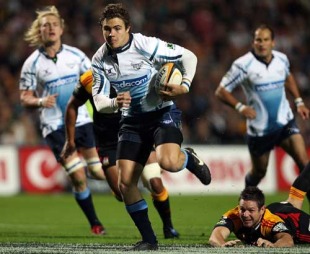|
Super 14
Boks banish fear factor
Stephen Nell
April 13, 2010

Bulls wing Gerhard van den Heever races clear of Mike Delany in Hamilton
© Getty Images
Enlarge
There was a time not so long ago where South African teams considered any success in New Zealand as a significant achievement. The Land of the Long White Cloud, it was thought, was not a place where you just simply did not win a rugby match. South Africa had longer tours than their New Zealand and Australian counterparts and this was often blamed for their lack of success in Super rugby. However, watching the Bulls score a bonus point victory over the Chiefs in Hamilton last Friday and then the Stormers thumping the Blues at Eden Park on Saturday, it has become apparent that South Africa have cracked the travel code. South African sides are now travelling over time zones in a good mental space. The Bulls and Stormers - traditional powerhouses of South African rugby in slightly different regional guises than their provincial bases of the Blue Bulls and Western Province - are going over with a winning mindset. When the Sharks managed to engineer a long overdue turnaround in what had been a horrendous start to their campaign of five consecutive defeats, they also did it in New Zealand, beating the Highlanders and Hurricanes on successive weekends. If you take the senior Springboks from these three franchises, you can put together a potent side that will be confident of winning anywhere in the Southern Hemisphere. And that should scare New Zealand ahead of next year's World Cup, a tournament which they will be under immense public pressure to win following their repeated failures on the biggest stage of them all. The All Blacks have become synonymous with choking at World Cups, but don't be surprised if they are simply outplayed in their backyard by a vastly experienced South Africa come the global showpiece. Of course, much rugby has to be played before the likes of John Smit, Victor Matfield, Bakkies Botha and Fourie du Preez embark on what is likely to be their international swansongs. One of success stories of this year's Super14 has been the continued rise of giant Stormers lock Andries Bekker. His father, Hennie, was a tourist to New Zealand on the controversial Springbok tour of 1981. Andries stands 2,08m tall and has marked himself as the obvious successor to Matfield. His dominant displays at lock also underline the difference between South Africa and New Zealand at this stage. South Africa's leading teams are using the lineouts as an important platform of attack and achieving success in that regard. Put simply, they appear to be better at the basics of the game than their Kiwi counterparts. The Stormers and Bulls have also been using the maul very effectively, while the Sharks appear to be following suit. It may not always be pretty, but it's pretty damn effective. I am not suggesting that South Africa are going to sweep all before them this year. In fact, their Test schedule is a very tough one and may just see them coming down from some of the dizzy heights they reached before embarking on their ill-fated Northern Hemisphere tour. However, what they won't do is quake in their boots at the prospect of playing two Tri-Nations games in New Zealand. It has been proved before that success in the Super14 often breeds success during the international season. Ironically, it was probably the decision to rest key All Blacks in 2007 that allowed South Africa to seize some kind of initiative in Super rugby. The Sharks and Bulls contested the final that year in a competition where South Africa had since 1996 only twice been involved in a final. On both those occasions - 1996 and 2001 - the Sharks were losing finalists away from home. The Bulls repeated their success in 2009 and you probably won't get great odds on a South African winner this year. Frans Ludeke's Bulls are heading up the table and Allister Coetzee's Stormers are in among the contenders. New Zealand's main threat is coming from the Crusaders, who have a culture of success in Super rugby that will probably continue to mark them as contenders long beyond the era of Richie McCaw and Dan Carter. Christchurch, in fact, is probably the only remaining venue in New Zealand where victories continue to elude South African teams. - Sanzar's executive committee met in Sydney last week and gave the thumbs down to a proposed competition in which the Northern and Southern Hemisphere's top club and regional teams would play in December 2012. Generally the Southern Hemisphere liked the idea, but the problem is the timing. New Zealand and South African have provincial competitions in the guise of the Currie Cup and NPC before their November tours. After that their teams are rested for a few weeks before pre-season training starts for Super rugby. As appealing as a Battle of the Hemispheres might be, it does not make a great deal of sense in the South outside Australia, who don't have a provincial competition. Furthermore, the timing will mean that it will involve South African and New Zealand teams when they are at their most vulnerable at the end of the year, which is hardly fair. Nevertheless, while Sanzar are not committing the Super14 winner to such a tournament, the proposal is still going to each individual union for consideration. It's not completely dead, but don't hold your breath. © Scrum.com
|
Live Sports
Communication error please reload the page.
-
Football
-
Cricket
-
Rugby
-
- Days
- Hrs
- Mins
- Secs
F1 - Abu Dhabi GP
Abu Dhabi Grand Prix December 11-131. Max Verstappen ()
2. Valtteri Bottas (Mercedes)
3. Lewis Hamilton (Mercedes)
4. Alexander Albon ()
5. Lando Norris ()
6. Carlos Sainz Jr ()
-
ESPNOtherLive >>
Golf - Houston Open
Snooker - China Open
Tennis - Miami Open

